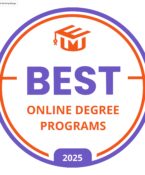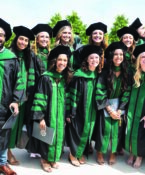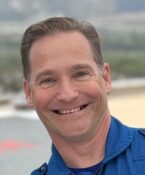Learning module from TCOM graduate is drawn from the heart
- October 22, 2024
- By: Steven Bartolotta
- Our People
Related Links
 At 20 weeks, a mother is roughly halfway through her pregnancy. Most anatomy sonograms show parents their baby’s features such as a nose and fingers, and whether it’s a boy or a girl. For Greg Carter, DO, a 2024 graduate of the Texas College of Osteopathic Medicine at the University of North Texas Health Science Center at Fort Worth, and his wife, that sonogram showed something terrifying. Their baby had a congenital heart defect. Dr. Carter and his wife were stunned.
At 20 weeks, a mother is roughly halfway through her pregnancy. Most anatomy sonograms show parents their baby’s features such as a nose and fingers, and whether it’s a boy or a girl. For Greg Carter, DO, a 2024 graduate of the Texas College of Osteopathic Medicine at the University of North Texas Health Science Center at Fort Worth, and his wife, that sonogram showed something terrifying. Their baby had a congenital heart defect. Dr. Carter and his wife were stunned.
“It’s terrifying because you don’t know what to do with it and you don’t know what it means,” Carter said.
It was 2018 at the time and Carter was leaving a 14-year career in finance and banking to begin his new journey into medicine. The exact nature of the diagnosis wasn’t known until she was born in May of 2018. Doctors performed an echocardiogram and the diagnosis was complex, it was Dextro-transposition of the great arteries (d-TGA), which is a life-threatening congenital heart defect that occurs when the heart’s two main arteries are switched in position. Multiple surgeries had to be done, quickly.
“The first thing she had was a PDA (patent ductus arteriosus) stent placed in that vessel, at the age of 14 days,” Carter said. “It was palliative to sustain blood flow to the lungs, and then she didn’t have a lot of blood flow to the lungs. Then around seven or eight months old, she had something called a bi-directional Glenn shunt procedure.”
All overwhelming and difficult circumstances to endure. Her condition is so rare, that only 1 out of 100,000 babies born each year have her type of congenital heart condition.
Carter’s journey to TCOM began at HSC’s College of Biomedical and Translation Sciences Medical Science program in 2018. He entered TCOM in the summer of 2020 and his past experiences with his daughter immediately drew him toward pediatrics – specifically pediatric cardiology.
It was during his third year at TCOM while on rotation at Driscoll Children’s Hospital in Corpus Christi when sitting with cardiologist Dr. Jerry T. Michael he discovered he had another talent. Drawing.
 “I was sitting with him one day and he said ‘draw me this heart anatomy, whatever way you want,’” Carter said. “My first drawing was very rudimentary, I think it was a square divided into four chambers. He said to make it look more like a heart, and the next thing I know is that I found out that I had this knack for drawing anatomy.”
“I was sitting with him one day and he said ‘draw me this heart anatomy, whatever way you want,’” Carter said. “My first drawing was very rudimentary, I think it was a square divided into four chambers. He said to make it look more like a heart, and the next thing I know is that I found out that I had this knack for drawing anatomy.”
This blossomed into more than just a hobby or busy work while on rotation, Carter became very adept at drawing the heart and with his situation at home, it became therapeutic for him as well.
This past spring in Carter’s final few months at TCOM when he was taking the Intro to Medical Education elective with Dr. Collin O’Hara, TCOM’s year 2 curriculum director, and associate professor in the Department of Medical Education and Health System Sciences, he had the opportunity to showcase his recently discovered talents.
One of the assignments for the class was for students to come up with a learning module that could be used for future classes at TCOM.
“We push students who take this elective to do something that they are interested in,” O’Hara said.
“When I got to Dr. O’Hara’s elective, she gave us the chance to pick what part of medical education we wanted to improve, and my mind immediately went to Dr. (Sam) Selby’s lecture on congenital heart defects because I loved his materials,” Carter said.
Carter weaved in the drawings he made over the last two years for his assignment, some of which included color for oxygenation and deoxygenation of the blood. O’Hara loved it.
“When Dr. Carter showed us the drawings that he did for this activity, we absolutely loved them because they were so detailed,” O’Hara said. “He (Dr. Carter) presented them to the Academy of Medical Educators in May. After the presentation, I talked with Dr. Selby about what he thought, and he loved it, so we said let’s do it.”
The drawings gave Selby, TCOM’s assistant professor in the Department of Pediatrics and Women’s Health and also a pediatric emergency medicine physician with Cook Children’s Hospital, an opportunity to use Carter’s work to create an interactive learning module for TCOM’s Class of 2027, who are in their Cardiovascular System Pass 2 course work.
 They devised a class where the students worked in groups and utilized Carter’s drawings to understand murmurs, blood flow direction, oxygenation status, and the complexities of heart defects and how to recognize them, but also remember them. The two-hour class was an overwhelming success.
They devised a class where the students worked in groups and utilized Carter’s drawings to understand murmurs, blood flow direction, oxygenation status, and the complexities of heart defects and how to recognize them, but also remember them. The two-hour class was an overwhelming success.
“I can’t give Dr. Carter enough credit,” Selby said. “He took a difficult subject and utilized his personal experience to fuel him to create something that is simply executed, yet powerfully effective. Those are the best solutions and something that our students have been doing under the guidance of people like O’Hara.”
Just how much of a success was it? In the post-course assessment, 93% of the students agreed or strongly agreed that the activity created by Carter actively enhanced their learning.
“I was not surprised that they enjoyed this modality,” Selby said. “Honestly I like to try and bring some levity and pique their interest with actual cases and clinical application as much as possible. The students engaged each other and the experts with their questions their creativity and laughter. Patients are more than just a set of symptoms and students do best, in my opinion, when we allow them to see problems from different angles, utilize different learning tools, and contextualize by putting experts in front of the students who can bring real-life stories. I would love to do this as much as possible.”
Not surprisingly, Carter is three months into his pediatric residency at the Cleveland Clinic. He’s taking things slowly in his residency, not making any long-term decisions on whether he wants to go into pediatric cardiology or not, but the field is a passion for him, and so are his drawings.
“I’m not breaking the mold though, people do this already,” Carter said. “But maybe someday I would like to have a way to have a description for a family of their child’s heart and I can draw it for them. I really like that we have come so far so quickly with congenital heart defects and are giving these children a chance to live a normal life. I do feel like I have so much to give back because of the pediatric cardiology field, we felt so supported.”
And how is his daughter? In September of 2023, she had a bi-ventricle repair surgery, but recovered very well and is now living the normal, active life of a first-grader, even to the degree of playing soccer. She will more than likely need one more surgery down the road due to the complexity of her condition, but her long-term prognosis is good.
While the learning module and pictures that TCOM students used didn’t include one of his daughter’s heart, it’s because of his heart that someday future osteopathic physicians will be able to help families, such as his, navigate congenital heart conditions.





Social media